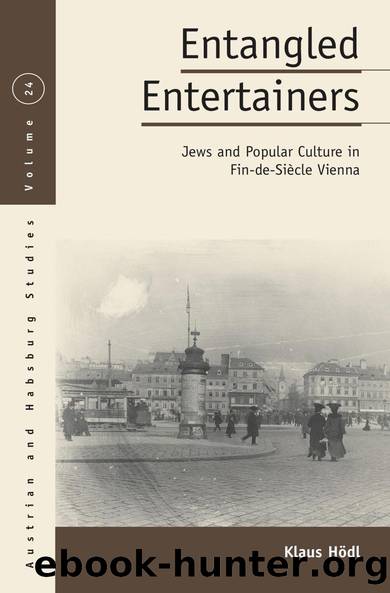Entangled Entertainers by Klaus Hödl

Author:Klaus Hödl [Hödl, Klaus]
Language: eng
Format: epub
Tags: Nonfiction, History, Austria & Hungary, Jewish
ISBN: 9781789201123
Publisher: Berghahn Books
Published: 2019-09-01T04:00:00+00:00
Conflict Becomes âWarâ
At the end of the meeting on 27 October 1902, the Volkssänger decided to submit a petition for their profession to be recognized as a licensed trade. They decided that they did not want to fundamentally modernize their profession and allow greater competition from unlicensed performers. The submission of the petition was entrusted to a committee that included, among others, Recher, Rötzer, and Hirsch.72 They also had the task of formulating any additional reforms. To discuss them, another meeting took place on 13 December 1902 at Café Polzhofer, a coffeehouse that Volkssänger frequented.
Reichsrat delegate Alois Heilinger (1851â1921) chaired this meeting. Heilingerâs participation shows that the Volkssänger situation was increasingly becoming a political agenda. Rötzer and Hirsch held the primary speeches at the meeting. Both reaffirmed the need to grant Volkssänger licenses for life. However, the authorities were to continue to have the ability to revoke the licenses of ensemble managers who failed to employ their members for the entire year. In addition, they discussed founding a cooperative for Volkssänger. The idea was that when someone applied for a license, the authorities would contact the cooperative prior to granting the license and ask it to weigh in on the applicant. Rötzer, Recher, and Hirsch would carry out any necessary preparations in advance.
At first glance, the willingness of the Volkssänger to allow the authorities to retain the power to revoke licenses seems like a concession to unlicensed performers. This would at least increase the likelihood that unlicensed Volkssänger could be granted a license and therefore be able to enjoy its benefits. The real reason that the Volkssänger relented, however, may have been the fear that a lack of official control could lead to abuses that would in turn be deleterious for the entire profession. The recent past provided an instructive example. In March 1896, the Vienna police revoked ten licenses because the ensemble managers in question were too old (or otherwise impaired) to run their own company. For example, it was an open secret that the troupe of Johann Kwapil, who was seventy-nine at the time, was de facto led by cast member Lina Ott.73 Nonetheless, Kwapil was still the licensee and had full decision-making power over his ensemble.74 Another Volkssänger director was said to have worked another job during the week and therefore allowed his troupe to perform only on Sundays. His employees were thus barely able to earn enough money to survive.
With the police confiscating licenses, many families fell into financial hardship. In reaction to this situation, the Volkssänger organized a meeting on 14 March 1896 in the Viennese district of Hernals. During the meeting, Hirsch proposed that they take up a collection for the families of colleagues who had lost their jobs. He also declared himself ready to lead a deputation that would submit a memorandum to Minister-President Count Kasimir Felix Badeni (1846â1909) regarding their recently unemployed colleagues.75 The meeting with Badeni took place two days later. Shortly thereafter, the police informed Hirsch that nine of the ten Volkssänger in question would be allowed to apply for a renewal of their license.
Download
This site does not store any files on its server. We only index and link to content provided by other sites. Please contact the content providers to delete copyright contents if any and email us, we'll remove relevant links or contents immediately.
| Civilization & Culture | Expeditions & Discoveries |
| Jewish | Maritime History & Piracy |
| Religious | Slavery & Emancipation |
| Women in History |
Cecilia; Or, Memoirs of an Heiress — Volume 1 by Fanny Burney(31338)
Cecilia; Or, Memoirs of an Heiress — Volume 3 by Fanny Burney(30935)
Cecilia; Or, Memoirs of an Heiress — Volume 2 by Fanny Burney(30891)
The Secret History by Donna Tartt(16635)
Sapiens: A Brief History of Humankind by Yuval Noah Harari(13059)
Leonardo da Vinci by Walter Isaacson(11907)
The Radium Girls by Kate Moore(10910)
Sapiens by Yuval Noah Harari(4540)
The Wind in My Hair by Masih Alinejad(4426)
How Democracies Die by Steven Levitsky & Daniel Ziblatt(4401)
Homo Deus: A Brief History of Tomorrow by Yuval Noah Harari(4282)
Endurance: Shackleton's Incredible Voyage by Alfred Lansing(3845)
The Silk Roads by Peter Frankopan(3764)
Man's Search for Meaning by Viktor Frankl(3636)
Millionaire: The Philanderer, Gambler, and Duelist Who Invented Modern Finance by Janet Gleeson(3572)
The Rape of Nanking by Iris Chang(3518)
Hitler in Los Angeles by Steven J. Ross(3439)
The Motorcycle Diaries by Ernesto Che Guevara(3338)
Joan of Arc by Mary Gordon(3260)
